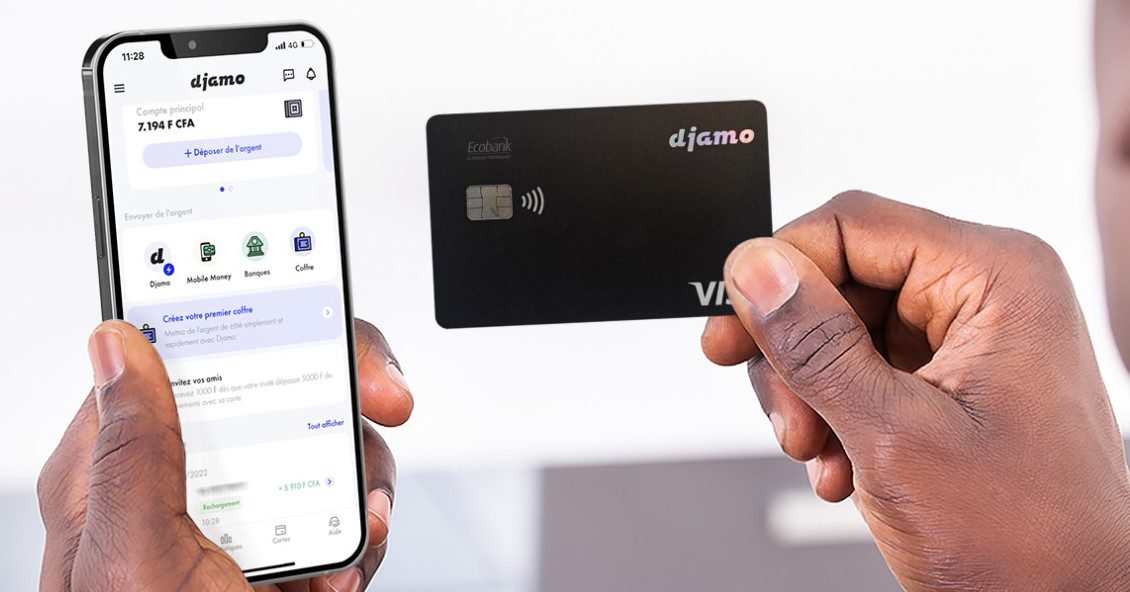Francophone Africa has long remained a blind spot in the African fintech story. While Nigeria, Kenya, and South Africa have become synonymous with innovation, much of French-speaking Africa has been underserved by both traditional banks and modern digital disruptors.
Into that gap stepped Djamo, an Ivorian fintech startup with a bold mission: to build the first full-stack digital bank for Francophone Africa.
Since launching in 2020, Djamo has onboarded more than 1 million users across Côte d’Ivoire and other UEMOA markets, offering simple, elegant financial tools to people who have traditionally been excluded from the formal financial system.
Its value proposition is clear: no paperwork, no waiting, no hidden fees—just banking that works.
.
Name: Djamo
Founded: 2020
Headquarters: Abidjan, Côte d’Ivoire
Founders: Hassan Bourgi, Regis Bamba
Markets: Côte d’Ivoire, Senegal, Burkina Faso, and expanding across UEMOA
Services: Debit cards, mobile accounts, savings tools, bill payments, salary services
Funding Raised: $14 million (Series A in 2023)
Key Backers: Y Combinator, Partech Africa, Khosla Ventures, Orange Ventures
Across the UEMOA region (which includes eight Francophone West African countries), more than 60% of adults are unbanked. For many, opening a bank account requires a formal job, proof of address, and a minimum balance—conditions that exclude the vast majority of informal workers and young professionals.
Djamo eliminates all of that friction. With just a smartphone and a national ID, users can open an account in minutes. The platform offers:
-
A free digital account
-
A physical Visa card for online and offline payments
-
Bill payment tools, salary deposits, and budgeting features
-
Personal finance tips tailored for first-time users
What sets Djamo apart is its understanding of its users—not just as consumers, but as aspirational digital citizens looking for a bridge to economic mobility.
From Product to Platform
While Djamo began with a simple prepaid card product, it has since evolved into a multi-service financial platform. Users can now receive salaries, pay bills, track spending, and even save automatically based on behavioral nudges.
In early 2024, Djamo introduced “Salaire+”, a salary-based feature that allows employed users to receive their pay directly into the app, set up recurring payments, and access budgeting tools. For many, this is their first experience with structured financial planning.
This kind of financial onboarding—starting with payments, then expanding into deeper services—is a model that could reshape financial inclusion across the region.
Scaling in a Fragmented Market
Scaling a fintech business in Francophone Africa comes with unique challenges: fragmented regulation, low card usage, and entrenched informal cash ecosystems.
But Djamo has turned these challenges into design opportunities. Its app supports local languages, integrates seamlessly with mobile money platforms like Orange and MTN, and offers user support through chat in French and regional dialects.
The team also takes a long view on growth, focusing on high-retention, active user acquisition, rather than vanity metrics. By building a product people genuinely want to use—not just download—Djamo has achieved one of the highest usage rates in its segment.
A YC-Backed Fintech That’s Staying Close to Home
In 2021, Djamo became the first startup from Côte d’Ivoire accepted into Y Combinator. That global validation brought capital, visibility, and access to a network of global fintech founders.
But Djamo never tried to build for Silicon Valley. Its founders remained in Abidjan and built their team locally, focusing relentlessly on solving deep, local problems with global-grade execution.
This blend of international discipline and regional grounding has become Djamo’s defining strength.
What the Industry Can Learn
Djamo’s rise offers critical lessons for fintech operators and investors interested in underserved regions:
-
Banking needs to be built, not just digitized. In markets with limited legacy infrastructure, there’s an opportunity to design fresh, modern financial systems from scratch.
-
Simplicity beats sophistication. Djamo’s clean UX, free core services, and clear onboarding process make it accessible to first-time digital users.
-
Francophone Africa is a frontier—not a footnote. With over 120 million people, the UEMOA region represents one of the largest untapped markets for fintech innovation.
-
Retention matters more than reach. By focusing on financial empowerment—not just transactions—Djamo is building long-term user relationships.
-
Trust is the real currency. Djamo’s transparency, in-app education tools, and local support have helped it build trust in an environment where financial institutions often fall short.
The Road Ahead
Djamo’s immediate focus is regional expansion—especially across Senegal, Burkina Faso, and Mali—where mobile usage is high but formal banking remains out of reach.
Over time, the company plans to introduce credit products, micro-investment tools, and deeper SME services for the region’s informal economy.
Its broader ambition is to become the financial operating system for Francophone Africa—not just a neobank, but a lifelong partner in economic growth.
About the Author
Aurel Kinimbaga is a fintech and digital infrastructure writer with a focus on West African markets. He covers financial innovation, inclusion, and startup ecosystems in Francophone Africa and beyond.
